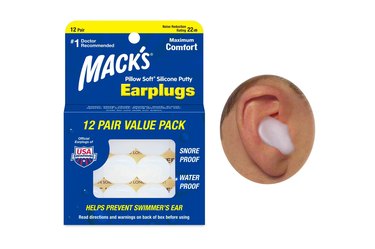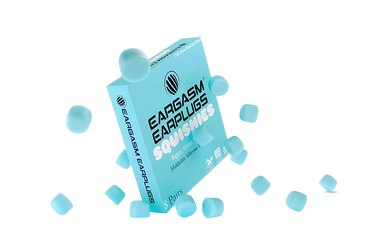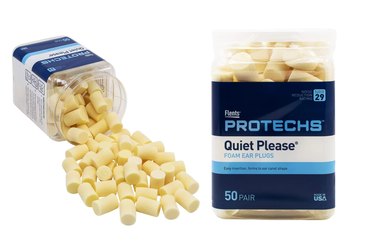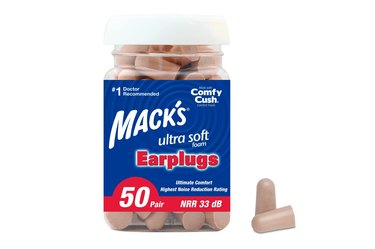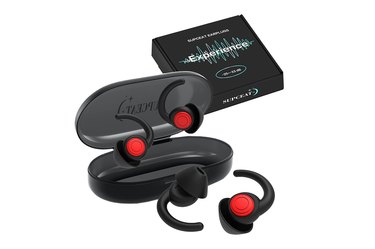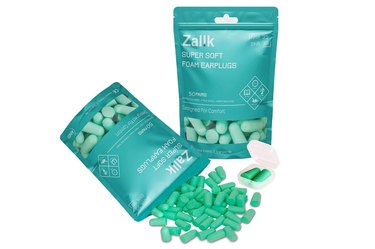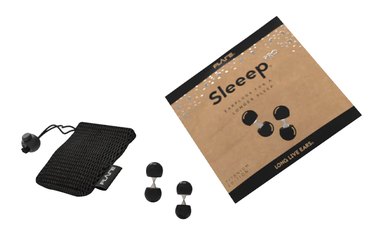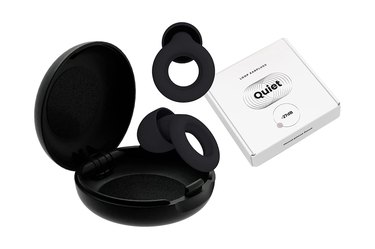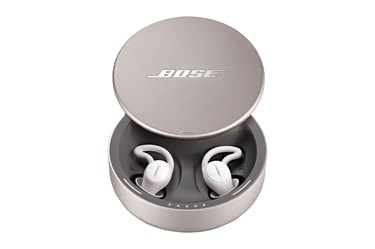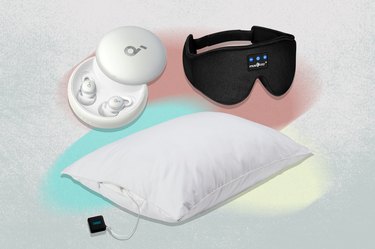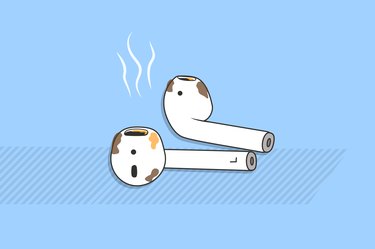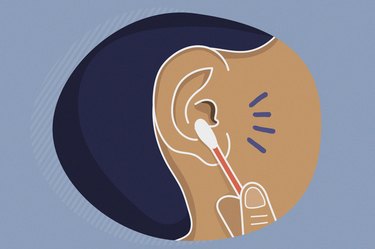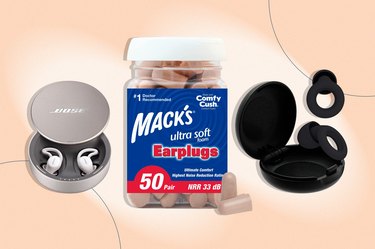
These days, it seems like it's harder than ever to get a good night's sleep — and external noises, like your partner's endless snoring and neighbor's blaring television, only add to the struggle. If you're wondering whether it's time to invest in the best earplugs for sleeping, that probably means it is.
"Well-fitting earplugs can help block out a variety of noises so you can sleep well despite them," says Michigan-based audiologist Amy Sarow, AuD. They do so by sealing off the ears, essentially acting as a protective barrier between you and the ambient noises keeping you awake.
Video of the Day
Video of the Day
"As long as you're following proper ear hygiene, wearing earplugs every night can be safe," Sarow says. Don't reuse disposable earplugs, and if you're popping in reusables, make sure to clean them regularly.
The Best Earplugs for Sleeping
- Best Overall: Mack’s Pillow Soft Silicone Putty Earplugs ($2.40, Walmart.com)
- Best for Wide Ear Canals: Eargasm Squishies Moldable Silicone Earplugs ($13.88, Amazon)
- Best for Small Ear Canals: Flents Protechs Quiet Please Foam Earplugs ($12.99, Amazon)
- Best for Comfort: Mack’s Ultra Soft Foam Earplugs ($8.99, Walmart)
- Best Reusable: Supceat Silicone Earplugs ($19.99, Amazon)
- Best Budget-Friendly: Zalik Super Soft Foam Earplugs ($7.99, Amazon)
- Best for Side Sleepers: Flare Audio Sleeep Pro ($28, Flare Audio)
- Best for Skin and Sensory Sensitivities: Loop Quiet Earplugs ($19.95, Amazon)
- Best for Tinnitus: Bose Sleepbuds II ($249, Amazon)
How We Chose
We got in touch with audiologists, who highlighted the most important qualities to consider when shopping for the best earplugs for sleeping — and how to better determine which types of earplugs might be the best for you, personally. Our top picks are based on their recommended criteria, such as:
- Noise reduction rating (NRR)
- Comfort
- Ease of use
- Cost
1. Best Overall: Mack’s Pillow Soft Silicone Putty Earplugs
Pros
- NRR: 22dB
- Moldable silicone
- Offer a precise fit
- Budget-friendly
Cons
- Sticky texture
- Can only be used up to 5 times
Custom earplugs are going to give you the best, most comfortable fit, but can be costly. Mack's Pillow Soft Silicone Putty Earplugs mold to fit virtually any ear sans the hefty price tag, making them rank as the best earplugs for snoring and other pesky noises, in large part due to their customizability and accessibility.
The earplugs have a sticky texture, so make sure to keep your hair away from them during use. While these do fall under the disposables category, they can be reused until they're either dirty or no longer sticky. Things like keeping your hands and ears clean and dry prior to using them will help prolong their usability.
Buy it: $2.40 for 6 pairs, Walmart.com; $12.99 for 12 pairs, Amazon.com
2. Best for Wide Ear Canals: Eargasm Squishies Moldable Silicone Earplugs
Pros
- NRR: 22dB
- Moldable silicone
- Larger than other brands
Cons
- Sticky texture
"Eargasm Squishies are made of a soft, proprietary silicone material that's moldable and can accommodate a larger ear canal," Sarow says. They provide more material than competing brands to ensure the best fit and are easy to break apart if you need to make them smaller.
They conform to any ear shape and create an airtight seal, making them suitable earplugs to block the sounds of snoring or abrasive noises that can contribute to age-related hearing loss. Just make sure to keep your hair away from your ears while you're using them, as they have a tackier texture.
Buy it: Amazon.com; Price: $13.88
3. Best for Small Ear Canals: Flents Protechs Quiet Please Foam Earplugs
Pros
- NRR: 29dB
- Easy to insert
Cons
- Stiffer material
For those with small ear canals, the size and shape of the Flents Protechs Quiet Please Foam Earplugs work well, Sarow says. They're easy to compress and insert, but are stiffer to the touch, so some might find the texture of them irritating.
Buy it: $12.99 at Walmart.com or Amazon.com
4. Best for Comfort: Mack’s Ultra Soft Foam Earplugs
Pros
- NRR: 32dB
- Extremely soft
- Great for blocking out snoring
Cons
- Easier to insert too far
They might not be the most exciting color in the world, but Mack's Ultra Soft Foam Earplugs are made of low-pressure comfort foam that's easy to compress and insert into the ear.
With their 32dB NRR rating, they're a definite contender if you're looking for the best earplugs for sleeping with a snorer. "These do take a while to expand in the ear, so be careful not to insert them too deeply," Sarow says.
Buy it: $8.99 at Amazon.com or Walmart.com
5. Best Reusable: Supceat Noise Reduction Earplugs
Pros
- NRR: 25dB
- Budget-friendly
- Come with 2 sizes of tips
Cons
- Might not block louder noises
The Supceat Noise Reduction Earplugs are made of soft silicone that's flexible, which can "minimize pressure and offer comfort in different sleep positions," Sarow says. They also come with two different sizes of tips to increase the chances of a precise fit.
Depending on your particular situation, louder or more aggressive noises might require stronger hearing protection to block them out optimally, but these earplugs can at least soften them.
Buy it: Amazon.com; Price: $19.99
6. Best Budget-Friendly: Zalik Super Soft Foam Earplugs
Pros
- NRR: 35dB
- Noise-cancelling
- Soft and comfortable
- Budget-friendly
Cons
- Shorter length
If you're looking for the best noise-canceling earplugs for sleeping and are on a budget, look no further. Zalik Super Soft Foam Earplugs are made of high-density foam, yet are soft and lightweight.
"Depending on the ear canal, though, their shorter insertion length may not be ideal for everyone," Sarow says.
Buy it: Amazon.com; Price: $7.99
7. Best for Side Sleepers: Flare Audio Sleeep Pro
Pros
- NRR: 32db
- Dual tips for extra comfort
- Comes with 2 tip sizes
Cons
- A bit pricey
"These earplugs work well for side sleepers because of their tiny 'dumbbell' shape," Sarow says. The spherical design of the memory foam tips mold to the shape of your ear canal, while the outer tip makes it more comfortable to lean the weight of your head on them.
Buy it: FlareAudio.com; Price: $28
8. Best Skin and Sensory Sensitivities: Loop Quiet Earplugs
Pros
- NRR: 27dB
- Made of super-soft silicone
- Come with 4 eartip sizes for optimal fit
- Reduces noise without cutting it off completely
Cons
- Might not be comfortable to all side sleepers
Loop Quiet earplugs reduce noise by 27dB, which is what most consider medium noise reduction. This means they'll block out most of the noise that's leaving you edgy and sleep-deprived without cutting you off from the outside world completely.
This also means they can effectively take the edge off in settings outside the bedroom, Sarow says. They come with four sets of eartips, making it easier for you to find the perfect fit — a handy bonus if you've got mismatched ear canals.
Buy it: $19.95 at Amazon.com or LoopEarplugs.com
9. Best for Tinnitus: Bose Sleepbuds II
Pros
- Come with 3 eartip sizes
- Up to 10 hours of use on a single charge
- Storage case gives up to 3 additional full charges
- Favorite sounds can be downloaded onto the earbuds
Cons
- NRR: N/A
- High price tag
- Might not be comfortable to all side sleepers
If you're not able to wear traditional earplugs due to tinnitus, enter Bose Wireless Sleepbuds II.
Designed specifically for sleep, these earbuds offer up a one-two punch of eartips that form a gentle-yet-secure seal to block external noise and soothing sounds — provided by the Bose Sleep app — that are optimized to play at just the right mix of frequencies to make tinnitus less perceptible to your brain.
"These sleepbuds are an investment, but well worth it if tinnitus, among other sleep-disrupting sounds, are keeping you awake at night," Sarow says.
Buy it: $249; Amazon.com; $189.99, BestBuy.com
How to Choose the Best Earplugs for Sleeping
Comfort and efficacy are subjective — the earplugs someone else considers the best for drowning out their snoring spouse or noisy neighbors won't necessarily be the best earplugs for you.
To help you personally choose the best earplugs for sleeping, experts recommend taking the following criteria into consideration:
1. Reusable or Disposable
Before going with reusable earplugs, be honest with yourself about the likelihood of your cleaning them regularly — say, you have a haphazard schedule or chronic illness that makes consistent practices like this a grind.
"I'm definitely a fan of disposable earplugs," Hadassah Kupfer, AuD, a New York-based audiologist and hearing aid specialist, tells LIVESTRONG.com. "Realistically, it's much more practical to keep them fresh on a nightly basis." Better that than risk an ear infection.
If you do decide reusables are best, do your best to wipe them with a tissue daily and deep clean them with a disinfectant wipe at minimum once a week (or as soon as you notice visible debris).
2. Price
When deciding on the best noise cancelling earplugs for sleeping, consider your budget. "Disposable earplugs aren't costly — typically, under $1 per set or cheaper if purchased in a bulk box," Kupfer says.
Non-custom reusable earplugs may be within the $10-$40 range, while earbuds specifically built for drowning out a snoring spouse or tinnitus usually cost $250 or more.
3. Noise Reduction Rating (NRR)
The higher the NRR number on a set of earplugs, the quieter it will be. But take heed: "Earplugs offering more attenuation may be less comfortable due to the density of materials, as well as the insertion depth required to accomplish greater noise attenuation," Sarow says.
When hunting for the best earplugs for sleeping, you'll ideally want them to have an NRR rating within the 25dB range.
Tip
Kupfer recommends using the lowest amount of NRR that does the trick for you — higher if blocking out your partner’s snoring, lower if muffling occasional street noise.
“From a sensory standpoint, it’s best not to become too dependent on earplugs in order to fall asleep,” Kupfer says. “Our ears become even more sensitive to sound if they get used to pitch quiet.”
It’s best if you can hear some sound through the earplugs — while still being muffled and providing relief — rather than absolute silence all the time, if for no other reason than to be able to hear your fire or security alarms should they go off.
4. Materials
Earplugs are typically made of foam, silicone and wax, with foam and silicone being the most popular options for sleep. ("I'm not a fan of wax earplugs, as there's too much room for error," Kupfer says.)
Foam earplugs are designed to fit inside the ear canal — they expand to fit the area and create a sound-blocking barrier as a result. They're the least expensive option of the bunch, but some may find foam irritating when trying to sleep.
"Silicone is a great choice for reusable earplugs," Sarow says. "It's easy to clean and well-tolerated by most individuals." They're designed to cover the entrance of the ear, rather than enter the ear canal.
Wax earplugs aren't as common and can be pretty pricey considering they're not designed to be reusable. But for people with funky-shaped ear canals who are struggling to find foam or silicone options that are comfortable, these shape to the outside of your ear to form a seal. (Ditto moldable silicone earplugs.)
"So long as they're comfortable and you follow the proper precautions, meaning dispose of single-use each time or regularly clean reusables, any of these options can become the best earplugs for sleeping," Sarow says.
5. Skin and Sensory Sensitivities
For people with a latex allergy or mast cell activation syndrome, make sure to scan the label to make sure the earplugs you're considering are latex-free and, ideally, state they're hypoallergenic somewhere on the label or in the product description.
"Reusable earplugs made of silicone or wax are good alternatives to foam varieties if you have sensory sensitivities, due to them being softer, gentler materials," Sarow says.
6. Your Preferred Sleeping Position
It can be hard to drift off if your earplugs are applying too much pressure in certain positions.
"If you prefer to sleep on your side, choose earplugs that are lightweight and can distribute pressure evenly across the surface area," Sarow says. (Bonus points if they're moldable to your ear and have shorter stems.)
7. Fit
Fit is as important for comfort as it is for noise reduction. When earplugs are too loose, they won't be able to adequately block out sound. Use earplugs that are too tight and not only do you risk discomfort, but trouble sleeping as a result.
To ensure correct fit, Kupfer says, the earplug should feel snug but not tight and there should be no pain or discomfort in your ear canal. You also want to make sure it's easily removable from your ear so it doesn't get stuck.
"Some people are aware of their unique ear canal geometry through unsuccessfully trying to wear standard earbuds," Sarow says, in which case you may want to go with earplugs made of malleable materials, such as moldable silicone or wax, to help create a good seal in the ear (or reusables that come with different sized tips in the pack).
How to Insert Earplugs Correctly
Once you've found the best earplugs for sleeping with a snorer (or coping with noisy neighbors), the next step is to master inserting them into those ear canals of yours. Follow these steps for each type of earplug:
Foam Earplugs
- Using clean fingers, roll the earplug into a narrow strand.
- With your opposite hand, pull the top of your ear up and back. (This helps to straighten out the ear canal.)
- Insert the earplug and hold it there with your finger until it expands to fill your ear canal. (If your voice sounds muffled, that means it's created a good seal.)
Pre-molded, Reusable Earplugs
- Pull the top of your ear up and back with your opposite hand.
- Using clean fingers and a gentle rocking motion, insert the earplug until you've sealed the ear canal.
- Directions for pre-molded earplugs vary by model (how the tip is shaped, how many flanges they have), so always insert them based on the instructions that come with the earplugs you've purchased.
Wax or Moldable Silicone Earplugs
- Using clean hands, soften the wax or silicone by rolling or kneading it between your fingers.
- Shape the wax or silicone into a cone shape.
- Push firmly inside the ear to seal it (but do not push it into the ear canal).
Was this article helpful?
150 Characters Max
0/150
Thank you for sharing!
Thank you for your feedback!
Is this an emergency? If you are experiencing serious medical symptoms, please see the National Library of Medicine’s list of signs you need emergency medical attention or call 911.
